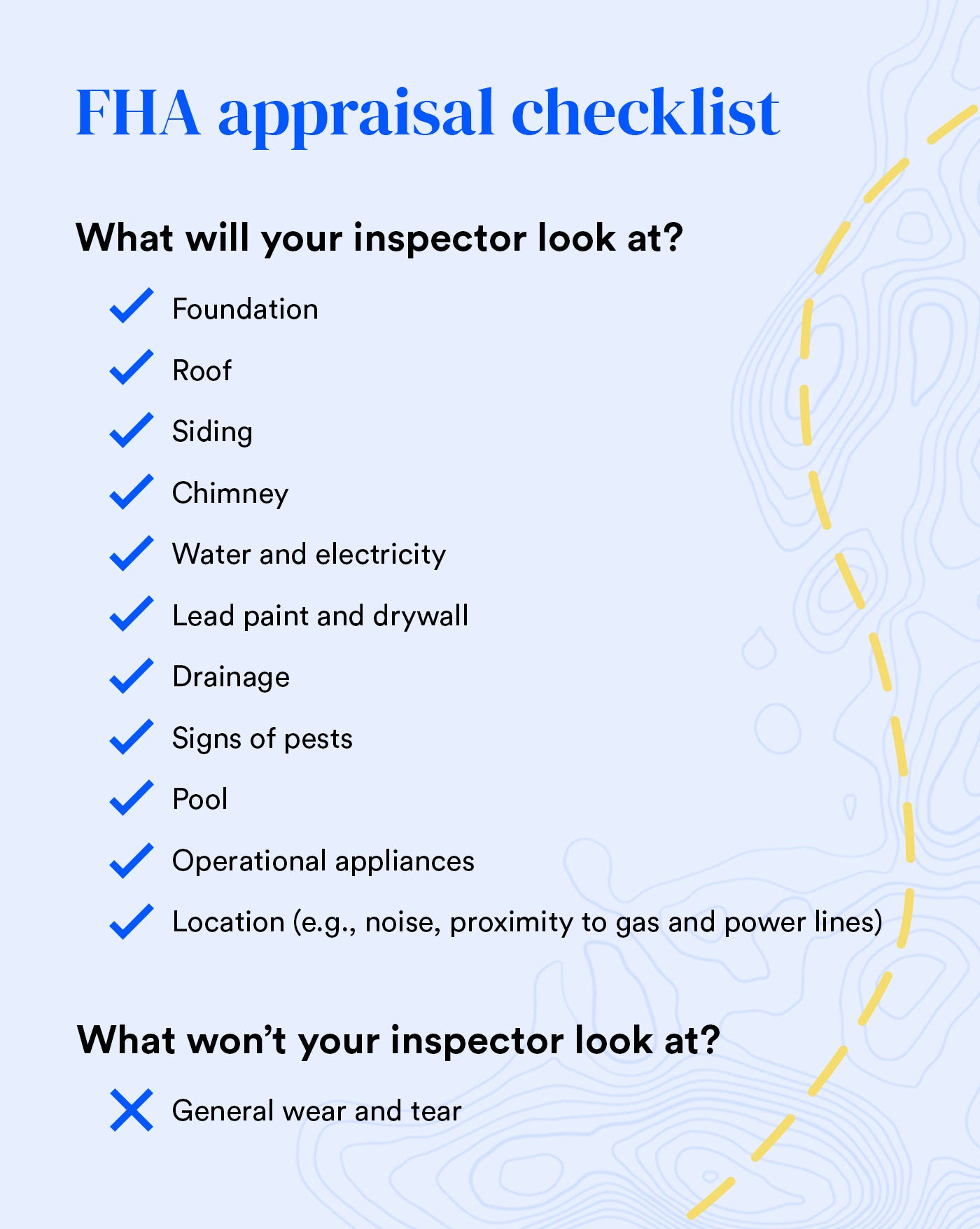The Good Brigade/Getty Images
Key takeaways
- An FHA appraisal assesses your home’s market value and condition to determine whether the home loan is a sound investment for the government to back.
- Your property will need to meet certain FHA inspection requirements during the appraisal process.
- An appraiser might list repairs that need to be made to make the home appraisal FHA-compliant.
Mortgage lenders require a home appraisal because they don’t want to extend more financing than your new property is worth. When you buy a home using a mortgage insured by the Federal Housing Administration (FHA), the property must undergo an FHA appraisal to determine whether it meets certain requirements. These standards are generally designed to ensure that the property is safe, sound and secure. Here’s how to prepare for FHA appraisal guidelines.
What is an FHA appraisal?
An FHA appraisal is a home appraisal that involves an FHA-approved professional evaluating a home to determine its market value. This step is required by lenders during the FHA mortgage process to ensure they’re not lending more than the home is worth. Similarly, the government requires this evaluation to ensure that the FHA loan is a solid investment and that the home meets standards established by the U.S. Department of Housing and Urban Development (HUD).
Appraisal vs. home inspection
How does an FHA appraisal work?
An FHA appraiser will observe, analyze and report on whether a property meets the U.S. Department of Housing and Urban Development’s (HUD) “minimum property requirements.” In the case of new construction, the property must also meet “minimum property standards.”
As HUD’s Single Family Housing Policy Handbook explains, the minimum property requirements are FHA’s general requirements that all homes it insures be safe, sound and secure. FHA’s minimum property standards, on the other hand, address the specific regulatory requirements surrounding the safety, soundness and security of new construction.
New construction is defined by HUD as properties being built, proposed construction or properties that were built less than one year ago. Existing construction is a property that has been 100 percent complete for more than one year or, if it was completed less than one year ago, it was previously occupied.
The FHA appraisal process typically looks like this:
- Appraiser visits – An FHA-approved, licensed appraiser visits the property to inspect its condition, including its interior, exterior and surroundings.
- Appraiser gives an opinion and writes a report – The appraiser takes photos to document the property’s condition and, in the case of a single-family home, completes a form called the Uniform Residential Appraisal Report, which outlines the various features of the property. For a condominium, the appraiser will complete a Condominium Unit Appraisal Report. In addition to reviewing the home’s condition, the appraiser will provide the FHA with an opinion regarding the property’s market value.
- Appraiser makes recommendations – If the property examination reveals issues that do not comply with HUD’s acceptability criteria, the appraiser indicates the exact repairs necessary and provides the approximate cost to fix the problems.
In some cases, an FHA appraiser is not able to determine whether a property truly meets HUD’s standards, and the mortgage lender might call upon another qualified inspector to review the property as well.
In general, you can expect an FHA appraisal to be completed within a week.
FHA appraisal guidelines
During an FHA appraisal, the appraiser will examine both the local market and the property itself. While there’s not much a prospective buyer can do to get ready for an FHA appraisal, homeowners putting their house on the market can certainly do their homework to help ensure their property meets FHA inspection requirements.
“As a property seller, the best way to prepare for an FHA appraisal is to visit HUD’s website and review the minimum property standards in order to make sure your home will pass that inspection,” says Christopher Linsell, a former real estate agent and director of content marketing at Elm Street Technology, which develops real estate software.
Market research
One of the first things that the appraiser will do is research the local residential real estate scene. One of the best ways to get information about the value of a home is to see what comparable properties have sold for recently.
Appraisers must cite some specific pieces of market research, including:
- Two comparable homes sales completed within 90 days
- Three recently closed sales in the same subdivision
- Two active listing or pending sales
FHA appraisal checklist
The appraiser will also look at the property itself when making an appraisal. HUD’s Single Family Housing Policy Handbook details a long list of conditions that will be reviewed as part of the appraisal process.
-
The inspector will look at the foundation for cracks and damage and evaluate the roof for leaks and loose shingles. Other physical attributes that they’ll check include siding, chimneys and drywall. An inspector is also responsible for making sure there is no defective construction or unremedied lead paint.
-
Your inspector also wants to make sure the major systems and utility features work like they’re supposed to. This includes ensuring the property has access to clean, hot running water and an electrical system with wiring that is up to code. Inspectors also look at lighting, sewage, appliances and outdoor features like swimming pools.
-
The area around your home is also important to evaluate. For instance, your inspector will look for pests that could damage the home, such as termites, and make sure the power lines are not too close to the property. An inspector might also note any potential for noise nuisance, like an adjacent highway or frequent airplanes. In addition, they’ll evaluate soil and yard grading.

EXPAND
Next steps after an FHA appraisal
Once the FHA appraisal has been completed, the mortgage lender will review the report.
There are a few potential outcomes of an FHA appraisal:
- No issues. The home came through the appraisal well and you can move forward with the purchase.
- Low appraisal. The appraiser believes the home is not worth enough to secure the loan. The lender may still be willing to offer financing, but a smaller sum. At this point, you can back out of the deal, try to negotiate a lower purchase price, or come up with extra funds to reduce the size of the mortgage you need. Just keep in mind that if you nix the deal, you could lose your deposit if your contract didn’t include an appraisal contingency.
- Repairs required. If there are significant repairs required to make the home worth enough to secure the loan, the lender will likely ask for them to be addressed, based on the appraiser’s recommendations. Depending on their severity, you may be able to provide evidence that the work’s been completed, or your lender may want to order a second appraisal to confirm the home’s new condition.
- Major hazards. Some hazards can be deal-breakers: Things that make the home unsafe to live in, like out-of-code gas or electric work or a majorly damaged foundation. The seller would need to agree to spend a large amount of money and time fixing these issues to get the deal to go through. If the seller does, you’ll definitely need to provide evidence of the completed repairs and the lender will order a second appraisal.
What happens if the FHA appraisal uncovers problems?
If there are issues, “the appraisal will outline exactly what needs to be repaired for the appraisal to be FHA-compliant,” says Ralph DiBugnara, president of Home Qualified, a real estate industry platform. In general, these repairs are expected to be completed before closing day. You may still be able to close on the home if you have a reason to delay the fixes, such as waiting until warmer weather to do outdoor repairs. Delayed repairs may require an extra escrow holdback that can be released once you complete all fixes recommended by the appraiser.
Generally, the seller is responsible for repairs unless otherwise stated in the purchase and sale agreement (PSA). Some PSAs will stipulate that the property is being bought ‘as is,’” says DiBugnara. In that case, it’s the buyer’s responsibility to fix them.
Consider an FHA 203(k) loan, which allows for financing the home purchase and the required repairs through a single mortgage. Borrowers can make various repairs using an FHA 203(k) loan, such as structural alterations, reconstruction, modernization and elimination of health and safety hazards.
FAQ about FHA appraisals
-
A home appraisal for a single-family home costs about $500 as of 2023, according to the National Association of Realtors. The price will depend on the level of demand in your area, how far the appraiser has to travel and the size of the house and lot. The homebuyer typically assumes this cost, and it may be folded into your closing costs.
-
In general, an FHA appraisal can be good for as long as six months, especially in a market where home values aren’t appreciating quickly. In a hotter market, an appraisal might only be good for three months before becoming outdated. If all goes well, you should be able to close within 30 or 45 days, well before the appraisal expires.
-
You need to get an FHA appraisal when using many types of FHA loans, including:
- FHA purchase
- FHA 203(k)
- FHA cash-out refinance
- FHA Reverse Mortgage (HECM)
You can skip the FHA appraisal if you’re getting an FHA streamline refinance loan.
-
An FHA home appraisal won’t catch every possible defect or problem. For instance, an appraiser isn’t likely to note dirty carpets or worn floors as long as they don’t present a safety risk. They also won’t note other eye sores like a chipped countertop or poorly installed crown molding if these defects don’t make anything inoperable or the home unsafe.
Read the full article here
















